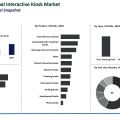Biostimulants market to reach valuation of ~us$ 5.5 bn by 2027
Biostimulants Market: Introduction
In terms of value, the global biostimulants market is anticipated to expand at a CAGR of ~12% from 2019 to 2027. The arable land has been decreasing since the last 50 years due to the surge in population and erosion of soil. Frequent plowing of fields and increase in usage of chemical-based fertilizers have led to substantial soil degradation. Erosion of soil has been occurring at 100 times greater pace than the rate of soil formation. Approximately 500 years are required for 2.5 cm of topsoil to be created considering the ecological changes. According to the European Commission, the amount of land used for agricultural purposes in Europe is likely to decline between 2018 and 2030. The area is projected to decrease from 178 million ha (hectare) in 2018 to 176 million ha in 2030. The demand for food is expected to increase due to an exponential rise in population across the globe. According to the United Nations, the global population is anticipated to surpass 9 billion by 2050. This is projected to propel the demand for high yield crop solutions such as biostimulants during the forecast period, thereby creating a positive outlook for the biostimulants market.
Request a Sample-
https://www.transparencymarketresearch.com/sample/sample.php?flag=S&rep_id=11099
Lack of Awareness Regarding Benefits of Biostimulants to Hamper Market
The rate of adoption of technologically advanced products is sluggish in agriculture and agriculture-related industries in developing economies such as India and Brazil. Conventional techniques are dominant in the agriculture sector in developing countries. Additionally, farmers are familiar with chemical-based agro products, owing to their ease of availability and lower prices vis-à-vis bio-based products. End users are reluctant to utilize advanced products, due to financial constraints. They continue to use conventional agro products over innovative agro products with better results and low impact on the environment. Thus, reluctance toward adoption of advanced products among farmers is a major restraint of the market
Request for covid19 impact analysis –
https://www.transparencymarketresearch.com/sample/sample.php?flag=covid19&rep_id=11099
Humic Acids & Fulvic Acids and Fruits & Vegetables Products to Dominate Biostimulants Market
In terms of product, the global biostimulants market has been divided into humic acids & fulvic acids, amino acids, microbial stimulants, seaweed, vitamins, and biorationals. Among these, the humic acids & fulvic acids segment dominated the global biostimulants market in terms of revenue in 2018. Humic acids and fulvic acids increase the cation exchange capacity (CEC) of the soil or any other substrate, thereby refining the soil capability to provide plants with crucial nutrients. Humic substances also facilitate electrochemical potential in the root zone. This boosts the uptake of nutrients. Humic and fulvic acids are intermediate chelators; they hold mineral ions in such a way that they are not lost in the soil, but are made available to plants when required. Humic substances form a passage between mineral cations and clay particles.
Commercial to be Dominant Application of Biostimulants Market
Based on application, the global biostimulants market has been segregated into fruits & vegetables, oilseeds & pulses, cereals & grains, turfs, landscapes, and ornamental flowers. The fruits & vegetables segment is anticipated to dominate the market from 2019 to 2027. When applied to fruits and vegetables, biostimulants enhance several parameters of the crop quality, including color, firmness, sugar contents (BRIX), and post-harvest quality. Biostimulants optimize the fruit size and crop uniformity. They stimulate cell division in young fruits. Biostimulants also offer nutrients vital for plant metabolic processes such as photosynthesis. This, in turn, increases the marketable yield.
Buy now-
https://www.transparencymarketresearch.com/checkout.php?rep_id=11099<ype=S
North America to be Lucrative Region of Biostimulants Market
Based on region, the global biostimulants market has been classified into North America, Latin America, Asia Pacific, Europe, and Middle East & Africa. The biostimulants market in North America is projected to expand at a CAGR of more than 11% during the forecast period. North America is expected to offer significant opportunities to the biostimulants market during the forecast period. Lack of a definite regulatory framework for biostimulants had been a challenge for market participants until recently. However, the U.S. Agriculture Improvement Act of 2018, also identified as the 2018 Farm Bill was passed in December 2018. It involved formal recognition of biostimulants and made significant provisions for them. The 2018 Farm Bill provided a clear boundary for distinguishing biostimulants from other agro products such as fertilizers and pesticides. Defining biostimulants and forming a regulatory path for their commercialization is expected to increase their adoption in the next few years. This is projected to provide lucrative opportunities to the biostimulants market in North America during the forecast period.
Competition Landscape
The global biostimulants market was highly fragmented, with various small- and medium-scale producers of biostimulants constituting nearly 60% share in 2018. Europe has been a lucrative region of the global biostimulants market for investors since the last few years. Of late, market participants have undertaken significant expansion initiatives in Europe. In January 2019, Premier Tech acquired TerreauxSTAR through its business unit called Premier Tech Horticulture France. The acquisition aimed to consolidate Premier Tech’s presence in the horticulture sector in France and the overall Europe region.
Key manufacturers operating in the global biostimulants market include Syngenta, Novozymes A/S, Valagro SpA, Isagro S.p.A., Agrinos, Biolchim SPA, Premier Tech Ltd., Agriculture Solutions Inc., West Coast Marine Bio-Processing, Corp., Italpollina S.p.A, Agricen, UPL, Koppert Biological Systems, Kelp Products International, and Haifa Group.
More Trending Report-






